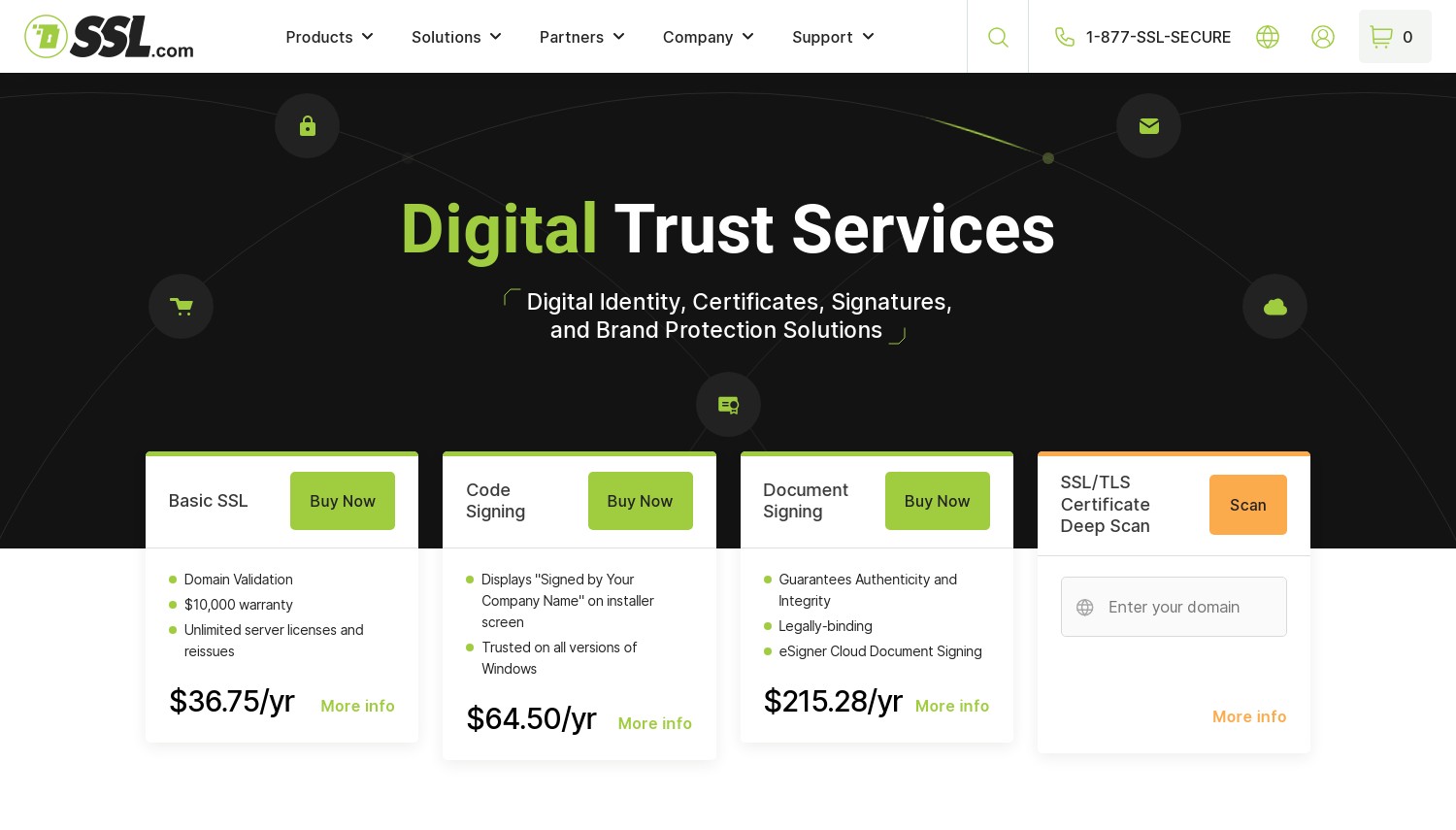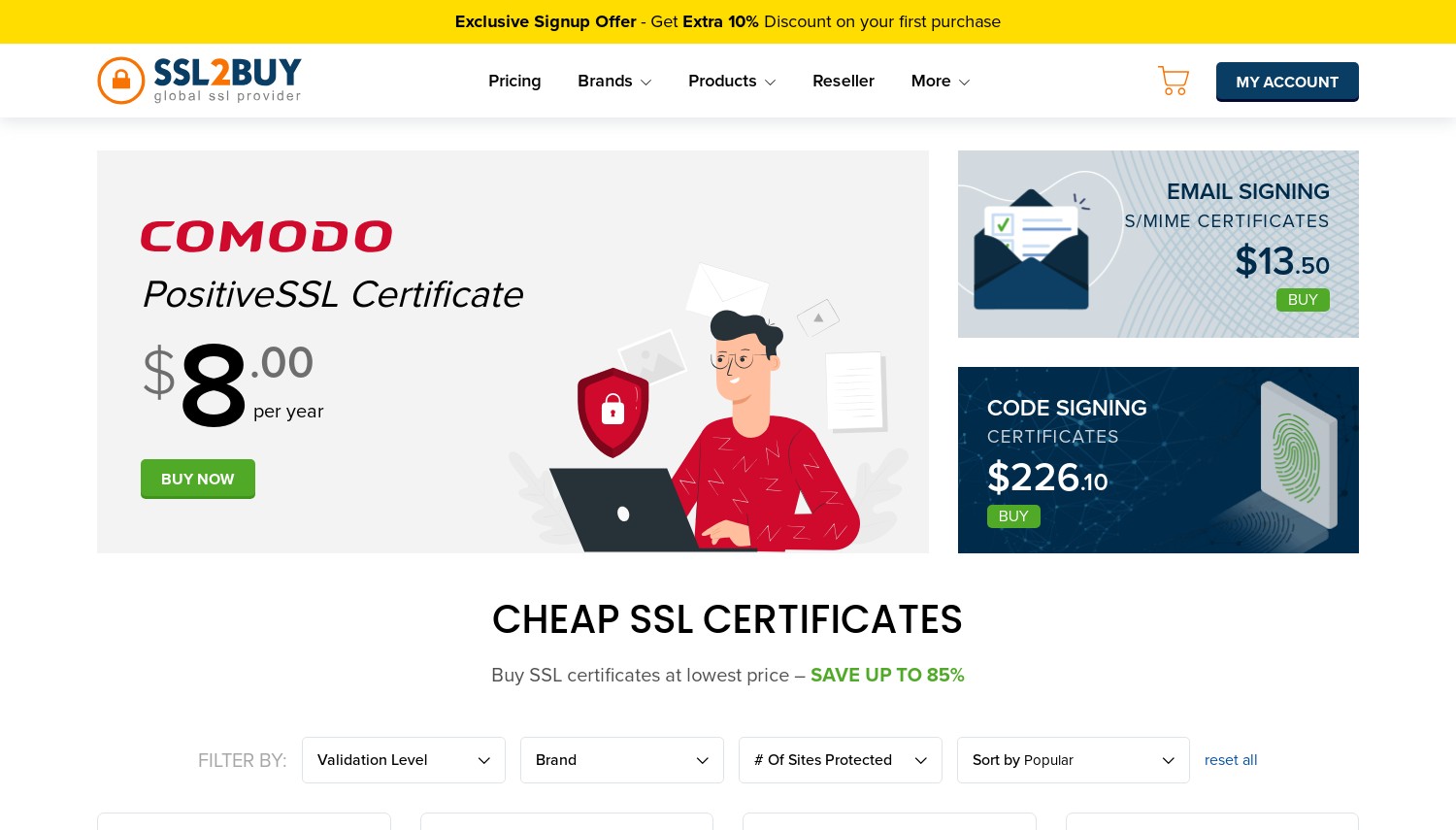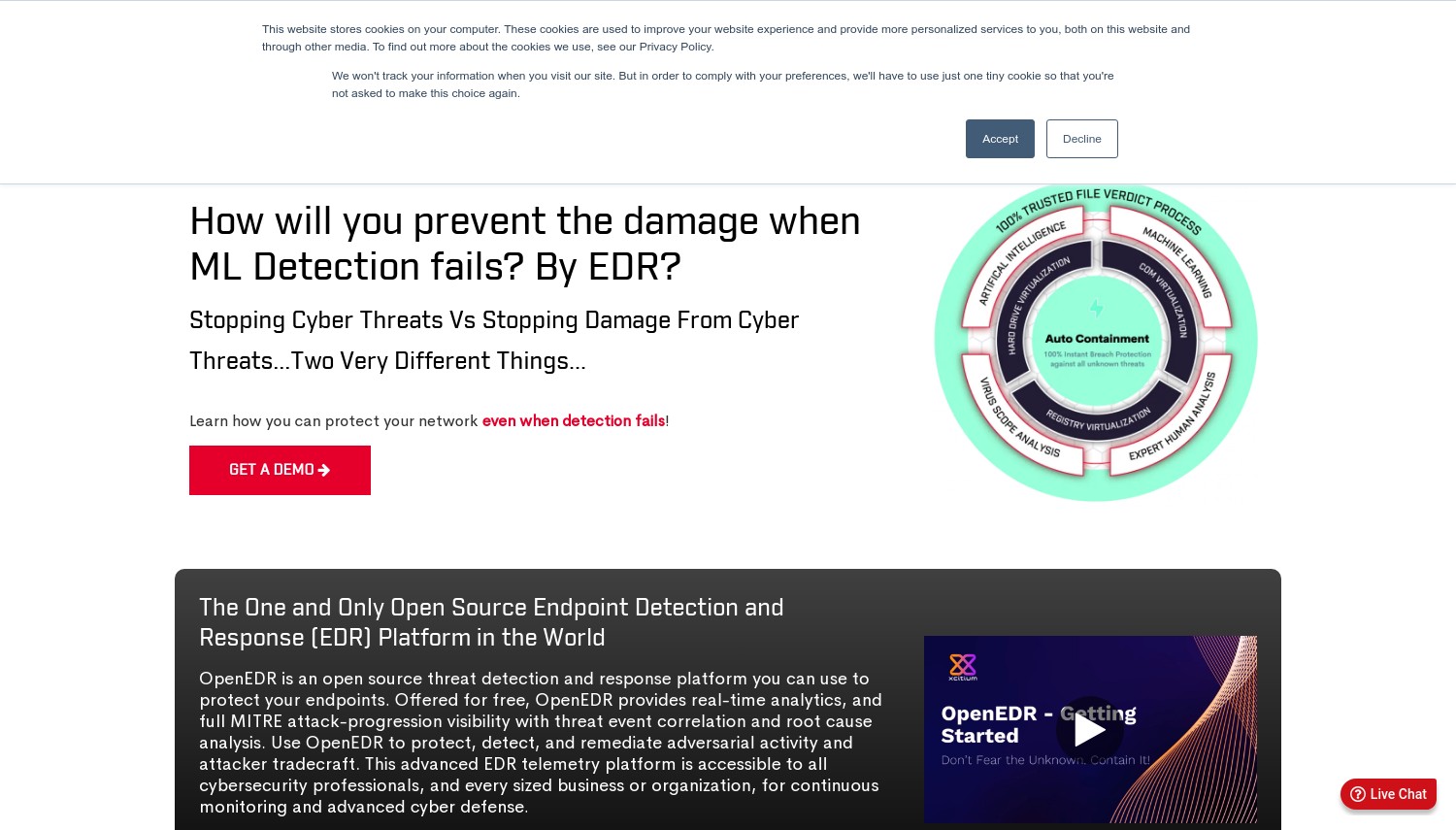4 Best SSL/TLS Certificate Providers for 2025
SSL/TLS Certificate Providers are organizations that provide digital certificates that enable websites to use the HTTPS protocol to securely transmit data over the internet.
These SSL providers are trusted entities responsible for issuing certificates and verifying a website's identity, ensuring that visitors can trust the legitimacy of the site.
SSL certification is the process by which a website's identity is authenticated and secured by an SSL provider, enabling encrypted data transfer and establishing trust between the website and its users.
These providers:
- Authenticate websites by verifying the identity of the owners
- Encrypt the data during the transfer between the website and the end user
| Hosting Provider | Reviews | Overall Rating | SSL Plan from |
|---|---|---|---|
1  GoDaddy GoDaddy
|
112.7k+ |

|
No data / mo. WB Free Trial |
2  SSL.com SSL.com
|
1.1k+ |

|
$36.75 / mo. |
3  SSL2BUY.com SSL2BUY.com
|
957 |

|
No data / mo. |
4  Comodo Comodo
|
160 |

|
$87.91 / mo. |
1. GoDaddy


 112.7k+
112.7k+
 4.5
Positive
4.5
Positive
 Positive
Positive

🔐 GoDaddy SSL/TLS Certificates Review
GoDaddy is one of the most recognized names in web hosting and domain registration, and they also offer a variety of SSL/TLS certificates. Here’s a detailed look at how their SSL offerings stack up:
✅ Pros
-
Brand Recognition & Trust
GoDaddy is a well-known brand, which can instill confidence for some customers, especially non-technical users. -
24/7 Customer Support
GoDaddy provides round-the-clock support via phone and chat, which is helpful for users needing assistance with installation or certificate management. -
Range of Certificate Types
Offers DV, OV, and EV certificates, as well as Wildcard and SAN/UCC options for multi-domain use. -
Warranty Included
Certificates include warranties ranging from $100,000 to $1,000,000, depending on the level (e.g., EV certs). -
30-Day Money-Back Guarantee
Users can get a refund if they’re unsatisfied and cancel within 30 days.
❌ Cons
-
Expensive Compared to Competitors
GoDaddy's SSL pricing is significantly higher than comparable offerings from competitors like Namecheap, ZeroSSL, or even Let's Encrypt (which is free). -
Aggressive Upselling
Users often report aggressive attempts to sell additional products during checkout. -
Confusing UI for SSL Management
The dashboard for managing certificates can be unintuitive, especially for first-time users. -
Lack of Free SSL
Unlike many hosting providers, GoDaddy doesn't offer free SSL (like Let’s Encrypt) with all hosting plans. -
Renewal Pricing is High
Initial discounts may disappear upon renewal, prices can more than double.
💵 Pricing (as of mid-2025)
| Certificate Type | First-Year Price | Renewal Price | Domains Covered |
|---|---|---|---|
| Standard DV SSL | ~$63.99/year | ~$84.99/year | 1 domain |
| Wildcard SSL (DV) | ~$295.99/year | ~$369.99/year | Unlimited subdomains |
| OV SSL Certificate | ~$149.99/year | ~$199.99/year | 1 domain |
| EV SSL Certificate | ~$199.99/year | ~$299.99/year | 1 domain |
| SAN/UCC SSL (DV) | ~$149.99/year | ~$199.99/year | Up to 5 domains |
Note: Prices can vary due to promotions or term length.
⚖️ Value Assessment
For beginners or those who want everything from one provider, GoDaddy’s SSL may offer peace of mind due to their support and integration.
However, the pricing is not competitive. You can get equivalent or better protection and features for a fraction of the cost through other CAs or via free options.
GoDaddy SSLs don’t offer unique technical advantages, they use the same encryption standards as most other CAs.
⭐ Final Verdict:
GoDaddy’s SSL Certificates are reliable but overpriced. Suitable for users who want a one-stop solution with support, but not ideal for budget-conscious or technically savvy users.
2. SSL.com


 1.1k+
1.1k+
 4.9
Positive
4.9
Positive
 Positive
Positive

| Price | |
|---|---|
| $36.75 / mo. | View Plan |
| $48.40 / mo. | View Plan |
| $74.25 / mo. | View Plan |
SSL.com SSL/TLS Certificates Review
✅ Pros
-
Excellent Customer Support:
Users consistently praise SSL.com’s fast, courteous, and technically solid support via chat, email, and phone.
“Very short wait time… issues solved within half an hour.” -
Comprehensive Certificate Portfolio:
Offers all major certificate types (DV, OV, EV) along with Wildcard, SAN/UCC, code-signing, and email/document signing. All use modern 2048+ bit RSA and ECC, include unlimited server reissues, and have generous warranties. -
Competitive Base Pricing:
- Basic DV SSL starts at $49 /yr, dropping to $41.65 /yr for 3–4 year purchases
- Wildcard DV begins at $224.25/yr
- EV SSL starts at $239.50/yr
-
Added Features & Services:
- Free unlimited reissues
- Unlimited server installations
- Real-time SSL/TLS Health Check Monitoring (HCM)
- 30-day trial of unlimited usage for code/document signing via eSigner service
❌ Cons
-
Cluttered & Confusing UI:
Multiple reviewers report a messy interface that makes finding orders and services frustrating.
“Very confusing website… hard to find purchase info.” -
Hidden Fees for Some Services:
Some users allege unexpected scanning fees, particularly for Wildcard certificates. -
Billing Transparency Issues:
Some reports note per-use charges for code/document signing services without upfront disclosure.
💵 Pricing Summary (Mid‑2025)
| Certificate Type | Typical Price | Notes |
|---|---|---|
| Basic DV SSL | $49–$41.65/yr | Discounts for multi‑year purchases |
| Wildcard DV SSL | $224.25+/yr | Covers unlimited subdomains |
| OV SSL | $48.40+/yr | “High assurance” entry-level OV |
| Premium SSL (OV multi-domain) | $74.25+/yr | Multi-domain via SAN/UCC |
| EV SSL | $239.50+/yr | $1.75 M warranty |
| EV SAN/UCC SSL | $319.20+/yr | Secure multiple domains with EV |
| Code Signing Certificate (2‑yr) | $116.10/yr | Plus monthly signing tiers |
Add-ons: Health Checks and eSigner extra tiers carry additional (sometimes unclear) fees.
⚖️ Value Assessment
Great for support-focused users:
If you need responsive customer service and a wide array of certificate types, SSL.com stands out.
Potential downsides in transparency:
The confusing UI and possible hidden fees mean less-savvy users should proceed carefully.
Pricing is mid-range:
Borderline premium for basic SSL; EV and Wildcard options are roughly aligned with market. Bulk purchases offer savings.
🌟 Final Verdict
SSL.com is a strong contender for those who value robust support and a full spectrum of certificate types, from DV to EV and code/document signing. However, be vigilant about hidden costs and navigate the UI with patience.
3. SSL2BUY.com


 957
957
 5.0
Positive
5.0
Positive
 Positive
Positive

SSL2BUY SSL/TLS Certificates Review
✅ Pros
-
Wide Certificate Selection:
Offers DV, OV, EV, Wildcard, SAN/UCC, Code Signing, and SSL for multiple subdomains. -
Attractive Pricing & Discounts:
Frequently offers promotional pricing, coupon discounts, and bundled multi-year savings. -
Free Tools & Services:
Includes free unlimited reissues, CSR generation assistance, and quick issuance for DV certificates. -
Responsive Customer Support:
Support via live chat, email, and phone, with generally fast turnaround times. -
Value‑Added Add‑Ons:
Offers services like vulnerability assessments, SSL health checks, and installation guidance.
❌ Cons
-
Website Usability Issues:
The user interface can be cluttered, with certificate options and add-ons sometimes hard to locate. -
Inconsistent Renewal Notices:
Some users report late or missing renewal reminders, leading to potential certificate expiry. -
Limited Transparency on Extra Fees:
Occasional service charges (e.g., emergency reissues or premium support) may not be prominently disclosed.
💵 Pricing Summary (As of Mid‑2025)
| Certificate Type | Typical Price | Notes |
|---|---|---|
| Basic DV SSL | ~$45–$55/yr | Often discounted with coupons |
| Wildcard SSL | ~$200–$250/yr | Covers unlimited subdomains |
| OV SSL | ~$70–$100/yr | “Business validation” assurance |
| EV SSL | ~$150–$250/yr | Higher warranty and trust indicators |
| SAN/UCC Multi‑Domain SSL | ~$100–$150/yr | Secure multiple domains with one cert |
| Code Signing SSL | ~$120–$180/yr | Two‑year options available |
Note: Actual prices depend on current promotions and chosen term length.
⚖️ Value Assessment
SSL2BUY delivers strong value for budget‑conscious users, especially with coupons and bundled discounts.
The inclusion of free support tools and responsive customer service makes it a solid choice for both novices and experienced users.
However, stay alert to possible hidden service charges and ensure you track renewal notices to avoid lapses.
⭐ Final Verdict
SSL2BUY is a cost-effective and comprehensive SSL provider with extensive certificate options and solid support. A good fit for users seeking affordability and flexibility, provided they monitor renewals and fees.
4. Comodo


 160
160
 2.0
Negative
2.0
Negative
 Negative
Negative

| Price | |
|---|---|
| $87.91 / mo. | View Plan |
| $227.91 / mo. | View Plan |
| $268.46 / mo. | View Plan |
Comodo (Sectigo) SSL/TLS Certificates Review
Comodo CA (now part of Sectigo) is a long-established Certificate Authority founded in 1998, known for offering a wide range of SSL/TLS solutions with strong encryption, compatibility, and competitive pricing :contentReference[oaicite:0]{index=0}.
✅ Pros
-
Competitive Pricing & Free Trial:
Basic DV certs often start as low as $4.99–$7.27/year with a 90‑day free trial available :contentReference[oaicite:1]{index=1}. -
Wide Product Portfolio:
Offers DV, OV, EV, Wildcard, Multi‑Domain, Multi‑Domain Wildcard, and Code‑Signing certificates :contentReference[oaicite:2]{index=2}. -
Strong Security Standards:
Uses 256‑bit encryption, 2048+‑bit RSA/ECC, SHA‑2 signing, and broad browser compatibility :contentReference[oaicite:3]{index=3}. -
High Warranty Levels:
Warranties range from $50K to up to $1.75 M for EV certs :contentReference[oaicite:4]{index=4}. -
Value‑Added Features:
Includes unlimited reissues/licenses, site seals, vulnerability/Pci scanning, HackerGuardian, and daily scans :contentReference[oaicite:5]{index=5}. -
Good Customer Support:
Support via phone, chat, email, and extensive knowledge bases; feedback is generally positive :contentReference[oaicite:6]{index=6}.
❌ Cons
-
EV Validation Delays:
EV certificate issuance may take several days :contentReference[oaicite:7]{index=7}. -
Mixed Support Feedback:
Some customers report slower support response or inconsistent experiences :contentReference[oaicite:8]{index=8}. -
Legacy Brand Confusion:
With rebranding to Sectigo/Xcitium, users may find overlapping product names and offerings :contentReference[oaicite:9]{index=9}. -
Past Security Incident:
In 2011, Comodo CA faced a compromised affiliate account issuing rogue certificates—though they were swiftly revoked and remediated :contentReference[oaicite:10]{index=10}.
💵 Pricing Summary (Mid‑2025)
| Certificate Type | Typical Price (1 yr) | Notes |
|---|---|---|
| Positive DV SSL | $4.99–$7.27 | Immediate issuance; $50K warranty :contentReference[oaicite:11]{index=11} |
| Essential DV SSL | $14.99–$23.33 | Immediate issuance; $10K–$50K warranty :contentReference[oaicite:12]{index=12} |
| Wildcard DV SSL | $49.99–$111.99 | Unlimited subdomains; $50K–$250K warranty :contentReference[oaicite:13]{index=13} |
| OV/Instant OV SSL | $21.99–$38.99 | 1–3 day issuance; $50K–$250K warranty :contentReference[oaicite:14]{index=14} |
| EV SSL | $235–$279 (Multi‑Year) | Rigorous validation; $1 750 000 warranty :contentReference[oaicite:15]{index=15} |
| Multi‑Domain / UCC / SAN | $69.99–$124+ | Up to 250 domains :contentReference[oaicite:16]{index=16} |
| Code‑Signing | $219.99–$279.99 | 1–5 day issuance :contentReference[oaicite:17]{index=17} |
Note: Prices vary by vendor and term length; warranties depend on certificate level.
⚖️ Value Assessment
Comodo/Sectigo offers exceptional value for users seeking affordability, broad product options, and strong security features. Their free trial and low entry cost are particularly appealing for testing or small deployments.
The inclusion of vulnerability scans, site seals, and comprehensive warranties gives them an edge over basic free SSL options.
However, if you require ultra-fast EV issuance or simplified branding post-rebrand, there may be quieter alternatives.
Continued vigilance with support expectations and understanding past security incidents is wise.
🌟 Final Verdict
Comodo (Sectigo) remains a top-tier SSL provider delivering strong tech, broad compatibility, and excellent value. Ideal for most users—especially those seeking low cost and solid features—while recognizing minor delays and occasional UI/support challenges.
HowToHosting.Guide Selected GoDaddy Reviews for Ssl
 Trustpilot User
from United States
Trustpilot User
from United States
 Trustpilot User
from United States
Trustpilot User
from United States
 Trustpilot User
from United States
Trustpilot User
from United States
7 Most Reviewed SSL Certificate Providers (Jul 2025)
| Hosting Name | User Satisfaction In % | Number of Reviews | Promotions |
|---|---|---|---|
 SSL.com SSL.com |
97% | 1129 | Visit Site |
 SSL2BUY.com SSL2BUY.com |
99% | 936 | |
 Amen.fr Amen.fr |
80% | 303 | |
 Host2Go Host2Go |
97% | 152 | |
 Da-Manager Da-Manager |
95% | 104 | |
 Comodo Comodo |
40% | 177 | |
 UniWebHosting UniWebHosting |
64% (less than 25 reviews) |
9 |
Benefits of an SSL Certificate
SSL helps secure internet connections and prevents malicious individuals from viewing or altering data transmitted between two systems. When you see a padlock icon near the URL in the address bar, it means SSL is protecting the website you are accessing. These are some of its most important benefits:
- Increased Security: An SSL Certificate helps to protect sensitive data transferred online, such as credit card information, login credentials, and other personal information, by encrypting the data. This helps to protect against eavesdropping, man-in-the-middle attacks, and other security threats. SSL certificates keep websites protected and are essential for securing sensitive data.
- Improved Customer Trust: An SSL Certificate is a sign of trust and reliability. Customers are more likely to trust and purchase from a website if they know their data is being securely transmitted and stored. Having an SSL certificate also helps prevent the 'not secure' warning from Google and can improve your website's ranking in search engines.
- Compliance with Regulations: Most industries require websites to have an SSL Certificate, especially those that process payments or store sensitive customer data. Free SSL certificates and affordable SSL certificates are available, making security accessible to small business owners.
Many SSL providers offer competitive pricing and the best prices for various SSL types, including options for multiple sites, subdomains, and unlimited subdomains.
Some providers act as a one stop shop, offering a range of SSL certificate services, including warranties and coverage for different SSL certs. Expert support and SSL experts are available to assist users, even those who are not tech savvy, with installation and management.
There are also enterprise solutions and extended validation package options for organizations with advanced security needs.
Providers such as Network Solutions, Entrust Datacard, Thawte SSL Certificates, Sectigo SSL Certificates, Digicert SSL Certificates, GeoTrust offers, and Comodo SSL are among the best SSL certificate services available, each with their own strengths.
SSL certification has evolved over the past few years, with providers offering more comprehensive and affordable options, including the lowest price plans.
Conclusion
In summary, SSL certificates are a cornerstone of modern web security, providing essential encryption and authentication to protect online transactions and sensitive data.
With a variety of SSL certificate types available—including DV, OV, EV, Wildcard, and Multi-Domain certificates—businesses can select the best SSL certificate to match their specific needs.
Effective certificate management, robust code signing practices, and choosing a reputable certificate authority are all key factors in maintaining secure connections and building digital trust.
By partnering with a trusted SSL certificate provider and implementing comprehensive security solutions, businesses can:
- Safeguard their websites
- Ensure secure online transactions
- Foster lasting customer relationships
Whether you’re managing a single site or multiple domains, investing in the right SSL certificates and security products is essential for protecting your business and your customers in today’s digital world.
What Is an SSL/TLS Certificate?
Transport Layer Security (TLS) and its predecessor, Secure Sockets Layer (SSL), are protocols that enable an authenticated and encrypted connection between computers in a network.
TLS and SSL are often collectively referred to as SSL/TLS. The latest version, TLS 1.3, was released in August 2018.
SSL/TLS certificates bind the identity of a website to a cryptographic key pair, which includes a public and private key.
SSL certification is the process by which a website's identity is verified and secured through the issuance of a digital certificate.
- The public key, part of the certificate, allows web browsers to establish secure encrypted sessions over HTTPS.
- The private key, kept securely on the server, is used to digitally sign content such as web pages and files.
Types of SSL Certificates
SSL certificates come in several types, each tailored to different security needs and levels of validation:
- Domain Validation (DV): Verifies only domain control. Ideal for blogs and small business sites needing basic encryption.
- Organization Validation (OV): Confirms domain ownership and organization identity. Suitable for businesses wanting to assure customers of legitimacy.
- Extended Validation (EV): Offers the highest authentication level with visible trust indicators like a green address bar. Best for e-commerce and high-trust transactions.
- Wildcard SSL: Secures a domain and all its subdomains with a single certificate. Cost-effective for businesses managing multiple subdomains.
- Multi-Domain SSL (SAN): Secures multiple domains and subdomains under one certificate. Ideal for complex environments.
Understanding these types—DV, OV, EV, Wildcard, and Multi-Domain—helps businesses choose the right level of security and validation to protect users and earn trust.
What Is the Difference Between HTTP and HTTPS?
The letter “S” in “HTTPS” stands for “secure.” HTTPS is the secure version of HTTP and uses SSL/TLS encryption to protect data in transit.
Websites with HTTPS addresses have been issued a legitimate SSL certificate by an authorized certificate authority. This ensures that communication between the site and its users is encrypted and authenticated.
Web browsers increasingly label HTTP sites as “not secure” to encourage secure browsing.
Benefits of HTTPS include:
- Data integrity and protection from tampering
- Authentication of the website’s identity
- Improved trust and credibility with users
- SEO advantages from Google and other search engines
Therefore, HTTPS is essential not only for security but also for user trust and search visibility.
